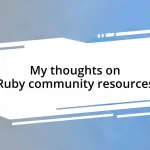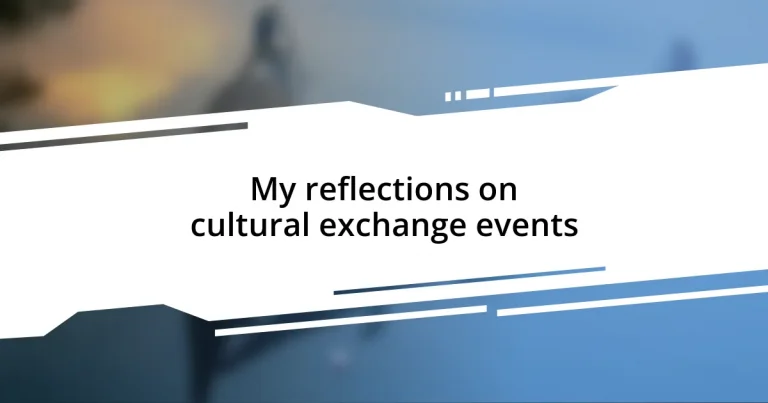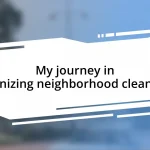Key takeaways:
- Cultural exchange events foster dialogue, understanding, and empathy through shared experiences and personal stories.
- They promote creativity and innovation by blending diverse artistic styles and encouraging collaboration.
- Challenges such as communication barriers and power imbalances can hinder effective exchanges, emphasizing the need for inclusivity.
- The future of cultural exchanges is enhanced by technology, making interactions more accessible and focused on collaborative solutions to global challenges.
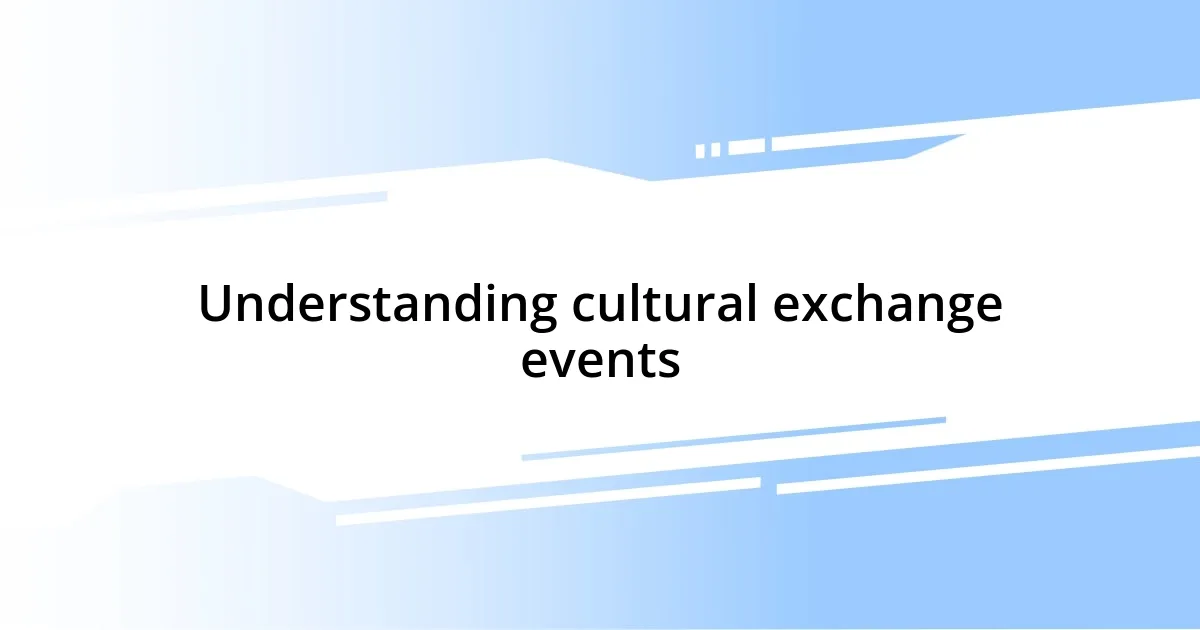
Understanding cultural exchange events
Cultural exchange events can be incredibly enlightening experiences. I remember attending a festival in a small town where each booth showcased food, art, and traditions from different countries. As I chatted with people from diverse backgrounds, I couldn’t help but wonder: how often do we really learn about others beyond the headlines?
These events create a unique space for dialogue and understanding. I’ve seen the joy on people’s faces as they try new dishes or learn a traditional dance. It makes me think about how much more common ground exists among us than we often assume. Can an afternoon spent sharing stories break down the barriers we’ve built?
At their core, cultural exchange events are about connection and empathy. I once participated in a workshop where participants swapped personal stories from their cultures. It was more than just conversation; it felt like an unspoken promise to respect and appreciate our differences. In those moments, I realized that each story carries a lifetime of experiences—how often do we take the time to listen?
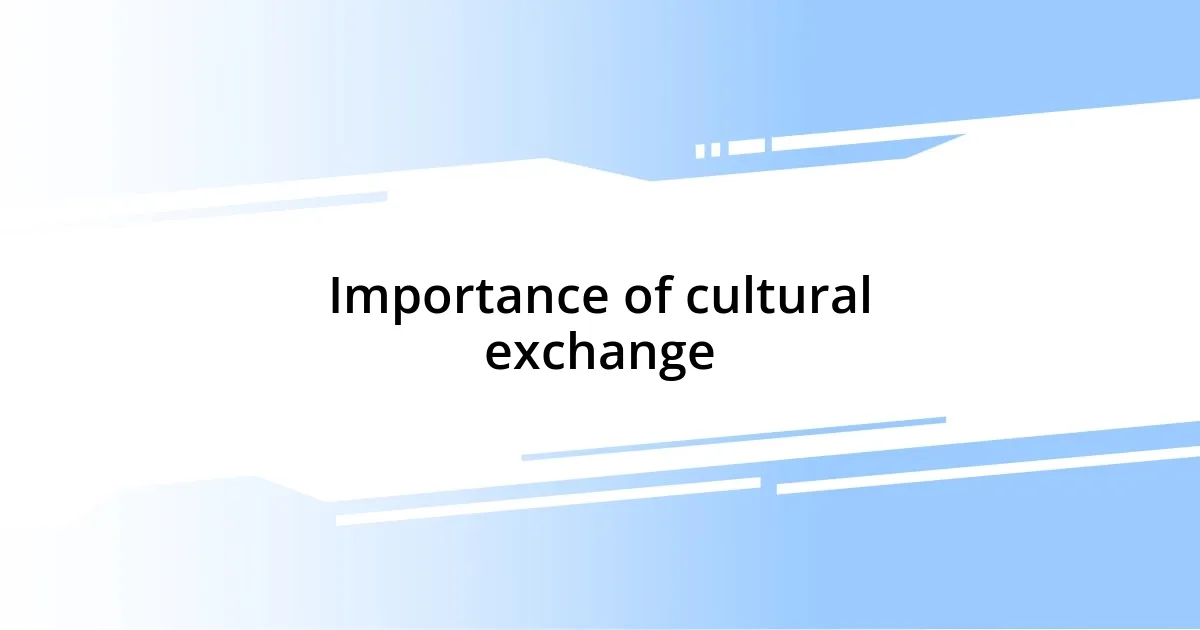
Importance of cultural exchange
Cultural exchange is vital in fostering mutual respect and understanding among diverse groups. I remember feeling a surge of excitement as I participated in a language exchange program. It was fascinating to see how individuals from different backgrounds could bond over their shared passion to learn and grow, despite language barriers. This experience reinforced my belief that cultural exchange opens doors to new perspectives and fosters tolerance, allowing us to coexist harmoniously.
Moreover, these events offer a wonderful opportunity for creativity and collaboration. At a local cultural fair, I engaged with artists who blended styles from their homelands with modern techniques. Witnessing this fusion made me realize how cultural exchange can spark innovation and inspire fresh ideas. Have you ever found inspiration in a place you least expected? I know I have, and it reminds me of the magic that happens when diverse minds come together.
Finally, the importance of cultural exchange lies in its ability to untangle stereotypes and cultivate understanding. I attended a panel discussion where individuals from various cultures shared personal experiences of prejudice and resilience. It was moving to hear their stories, and it made me confront my own biases. This is the transformative power of cultural exchange—it can redefine how we see one another and, ultimately, ourselves.
| Benefits of Cultural Exchange | Examples |
|---|---|
| Fosters Understanding | Language exchange programs |
| Encourages Creativity | Artistic collaborations at festivals |
| Challenges Stereotypes | Personal stories in discussions |
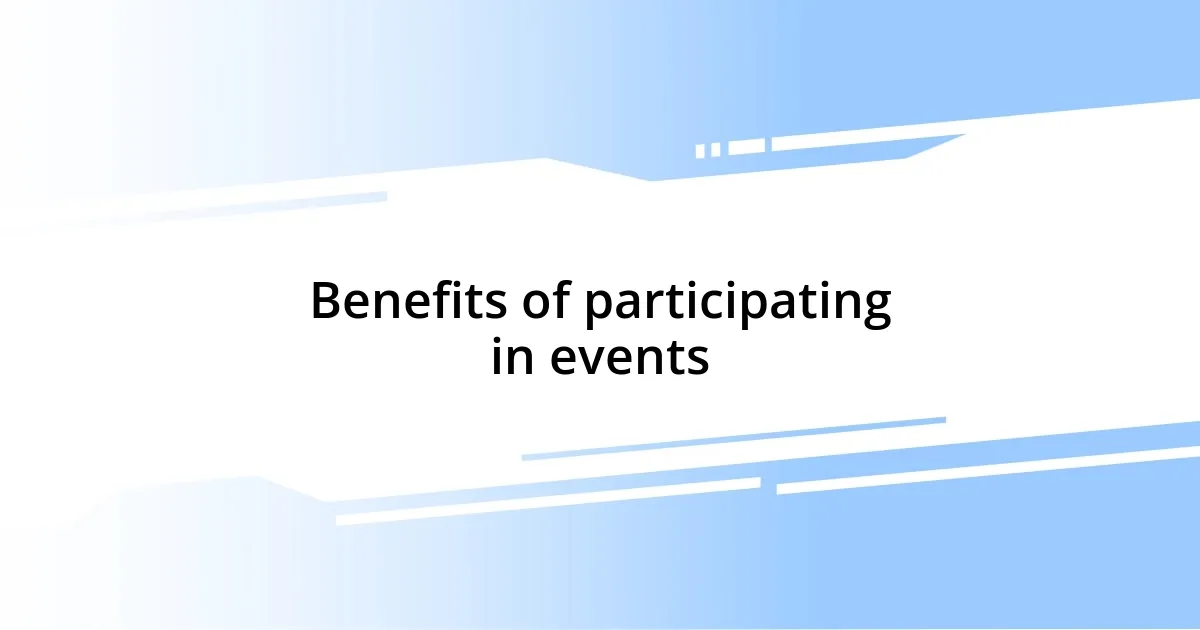
Benefits of participating in events
Participating in cultural exchange events brings a treasure trove of personal growth and community engagement. I still remember my first time trying my hand at a traditional Japanese tea ceremony. I was nervous, unsure if I’d honor the custom properly, but the warmth and encouragement from the participants made me feel welcomed. This experience deepened my appreciation for their culture and reminded me how such interactions can nurture a sense of belonging.
- Broadened Perspectives: Engaging with someone from a different background can shift your viewpoint in unexpected ways.
- Improved Communication Skills: Navigating diverse environments enhances your ability to connect and communicate with others.
- Enhanced Empathy: Understanding stories and experiences from various cultures cultivates a greater sense of compassion.
- Networking Opportunities: These events can lead to lasting friendships and professional connections across the globe.
The benefits are not just about knowledge; they are profoundly emotional. I recall attending a storytelling night where individuals shared their migration experiences. I felt a deep connection as I listened to their struggles and triumphs. It was a powerful reminder that behind every face lies a unique story, fostering a sense of collective humanity that transcends borders.
- Cultivated Friendships: Bonds often form from shared experiences and a mutual love for culture.
- Increased Cultural Awareness: Each event is a chance to learn something new and gain insights into other ways of life.
- Promoted Personal Development: Stepping out of your comfort zone leads to growth and self-discovery.
- Celebration of Diversity: These gatherings highlight the beauty of different cultures, enriching the community.
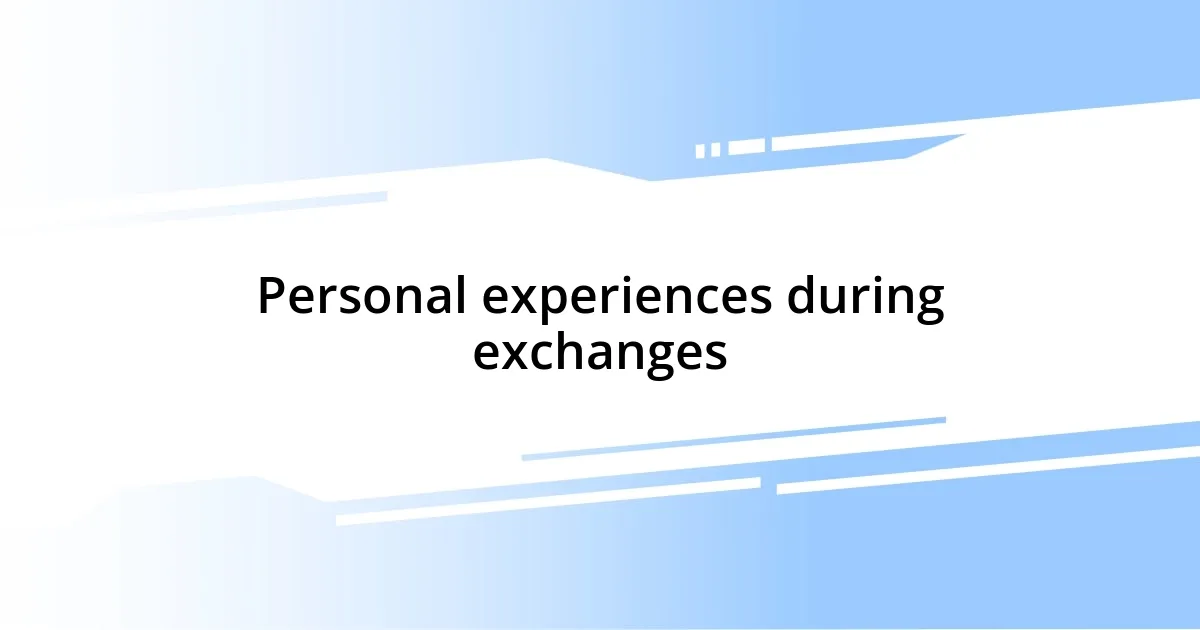
Personal experiences during exchanges
During a recent cultural exchange event, I found myself in a cooking workshop where participants shared family recipes. As I attempted to make a traditional Moroccan tagine, the warmth of my instructor’s laughter filled the kitchen. I often reflect on that moment—how food can transcend borders and create an intimate bond amongst strangers. Have you ever shared a meal that felt like a bridge between two worlds? For me, it was that tagine, and it sparked a curiosity about the stories behind every ingredient.
One of the most profound personal experiences occurred during an art exchange project. Collaborating with an artist from Brazil, I witnessed how our different styles meshed to create something unique. Every brush stroke felt like a conversation, revealing not just techniques but emotions and cultural narratives. I often wonder how many collaborations began with a simple shared interest, unlocking creativity that neither of us could have achieved alone. That day, I learned that art truly knows no boundaries.
At another event, I participated in a community dialogue where we shared experiences of identity and belonging. Listening to the heart-wrenching yet hopeful stories of others ignited a connection I didn’t expect. It made me confront my own narratives and biases. Isn’t it fascinating how the act of sharing can lead to profound introspection? This exchange taught me that understanding begins with empathy, and each voice has the power to reshape perceptions and inspire change.
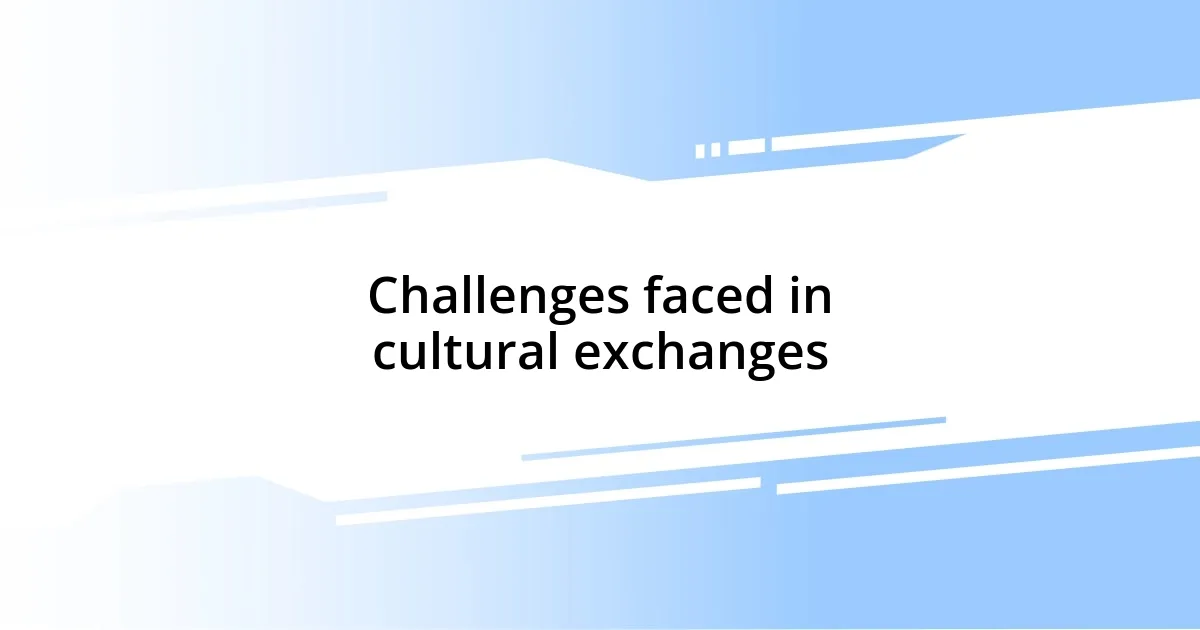
Challenges faced in cultural exchanges
Cultural exchanges inevitably come with their own set of challenges, often stemming from deep-seated misunderstandings. I remember a time at a multicultural festival where an attempt to explain the significance of a traditional dance became a point of confusion. Some participants misinterpreted the shared narratives as stereotypes rather than appreciating the cultural depth behind them. It made me realize how crucial effective communication is in bridging our differences.
Another challenge I’ve observed is the imbalance of power in participation. During a panel discussion on global issues, I witnessed a dominant voice overshadowing quieter, less represented cultures. It struck me as unfair, and I couldn’t help but wonder—how do we ensure every voice is heard? This experience taught me that inclusivity is not just about participation; it’s about creating a space where everyone feels safe to share their perspective.
Moreover, logistical hurdles often dampen the spirit of these exchanges. For instance, at an art exhibition showcasing works from various countries, the language barrier limited meaningful conversations about the artworks. I wished for an immersive experience where artists could convey their visions without hindrance, provoking thoughts and feelings without the filter of translation. It left me pondering—are we missing out on powerful connections because of mere words?
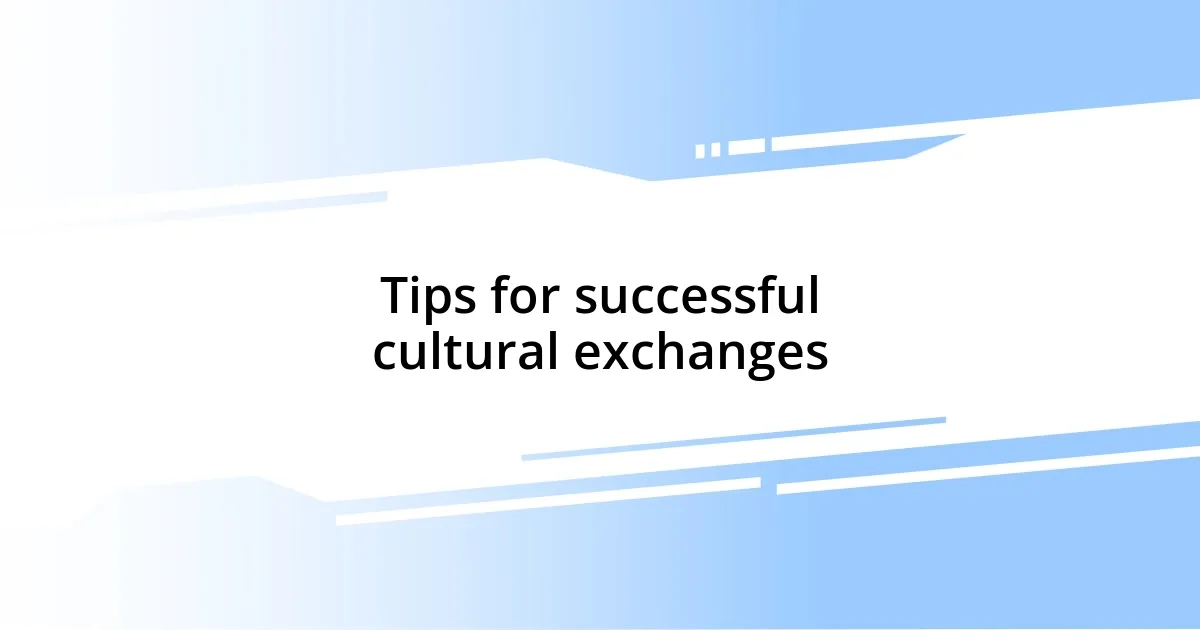
Tips for successful cultural exchanges
When planning a cultural exchange event, remember that preparation is key. I often find that simply understanding the background of the cultures involved can make a tremendous difference. For instance, at an exchange I attended, we took time to learn about each other’s customs and expectations before diving in. This led to more enriching interactions and fewer misunderstandings. Have you ever walked into a situation completely unaware of the context? It can be daunting!
Creating an atmosphere of openness and curiosity is another essential tip. I vividly recall a discussion at one event where a participant boldly shared a personal story that sparked a cascade of responses—each revealing something unique about our diverse backgrounds. It encouraged everyone to dig deeper into their own experiences. Isn’t it amazing how one person’s courage can inspire a wave of openness? I’ve realized that these moments are often where the real magic of cultural exchange happens.
Lastly, facilitating follow-up interactions can solidify the impact of cultural exchanges. After a collaborative project I took part in, we formed a small group to continue our discussions online. This ongoing dialogue allowed us to deepen our connections and foster friendships beyond the initial event. Have you ever stayed in touch with someone you’ve met in a short encounter? Those relationships can blossom into something truly meaningful, enriching both your understanding and appreciation of different cultures.
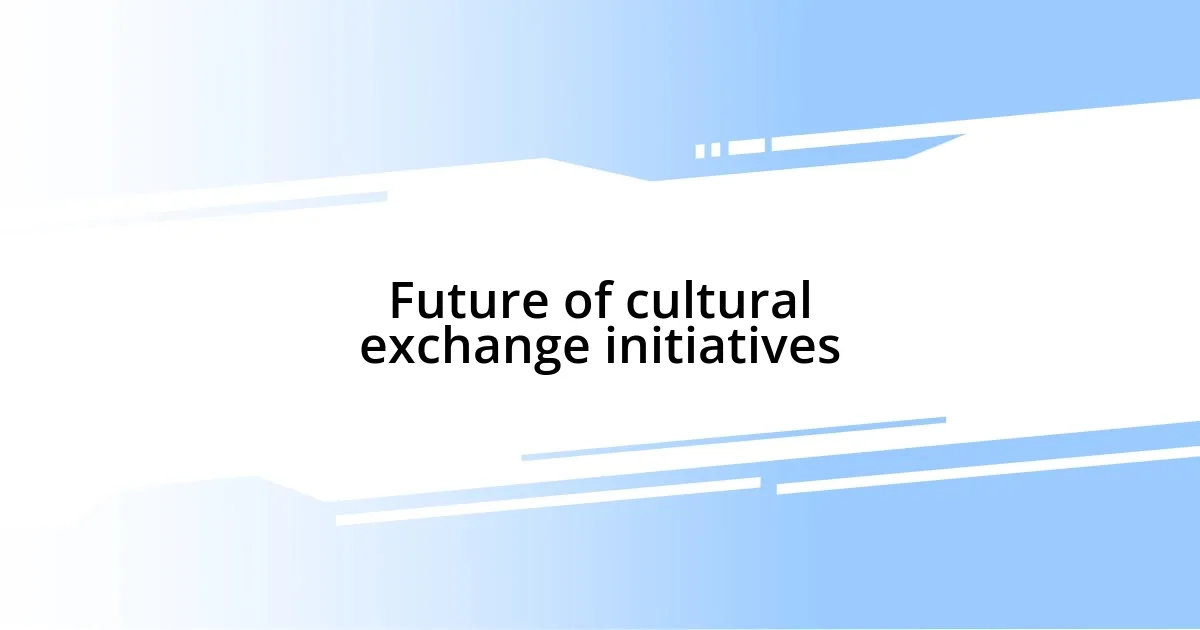
Future of cultural exchange initiatives
The future of cultural exchange initiatives appears promising as technology continues to break down geographical barriers. I recently participated in an online exchange program where participants from diverse backgrounds shared their stories through virtual platforms. It was fascinating to see how a simple video call could replace the need for travel, making connections more accessible while still fostering genuine interactions. Could this be the future, where technology enhances our cultural understanding while making exchanges more inclusive?
I believe that as we look ahead, incorporating local communities into these exchanges will be crucial. For example, I recall visiting a cultural workshop where local artisans shared their skills with international participants. The experience was transformative—not just for us as attendees, but for the artisans who gained recognition and appreciation for their crafts. What if this model could be expanded globally, allowing communities to showcase their heritage while simultaneously learning from others?
Furthermore, I envision these exchanges evolving to focus more on addressing global challenges collaboratively. During a recent event focused on sustainability, the cross-cultural dialogue led to innovative solutions that combined traditions from various cultures. It was an eye-opening experience to see how different perspectives could unite to tackle complex issues. Isn’t it exciting to imagine what could happen if cultural exchanges became a platform for global problem-solving, igniting creativity and collaboration?




